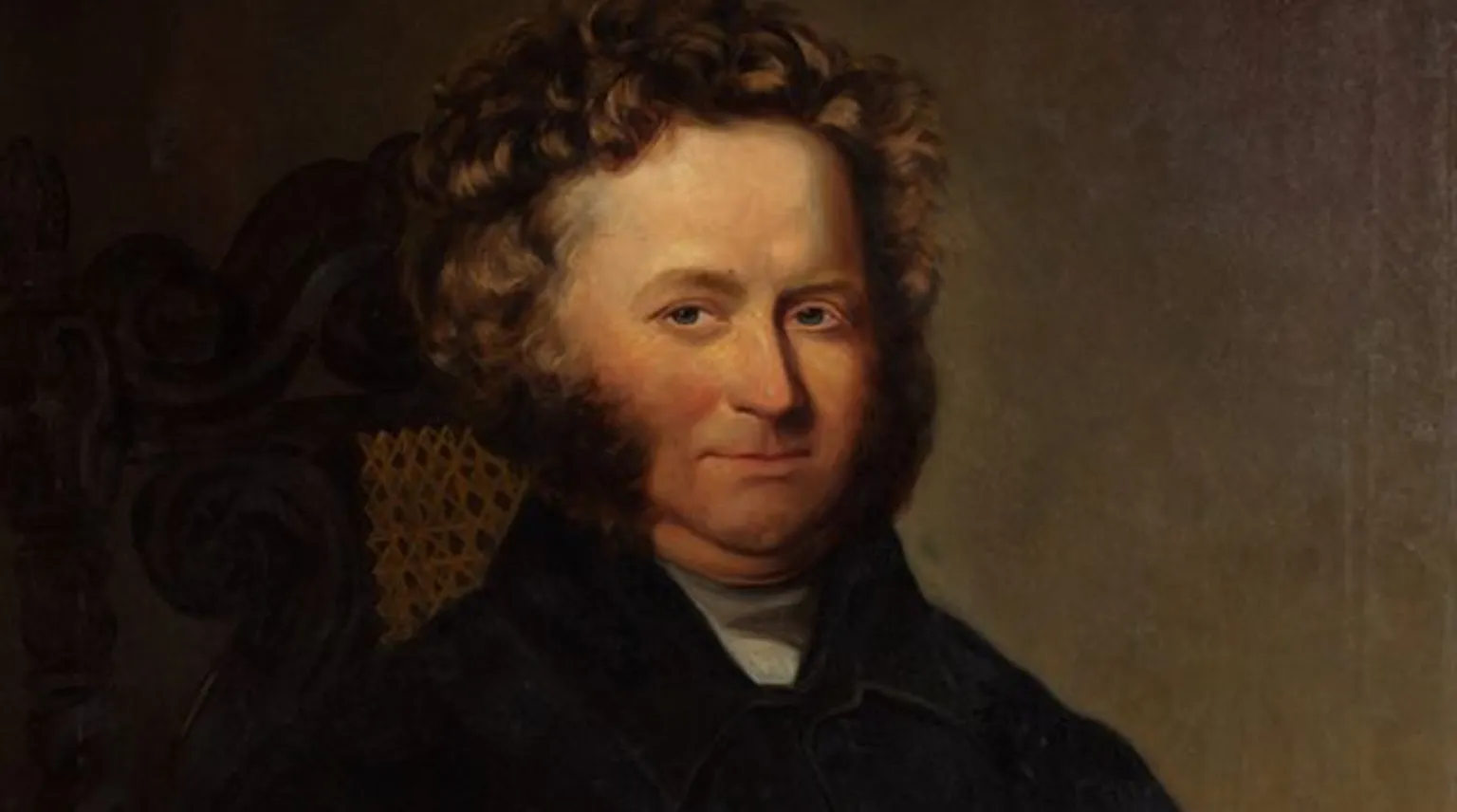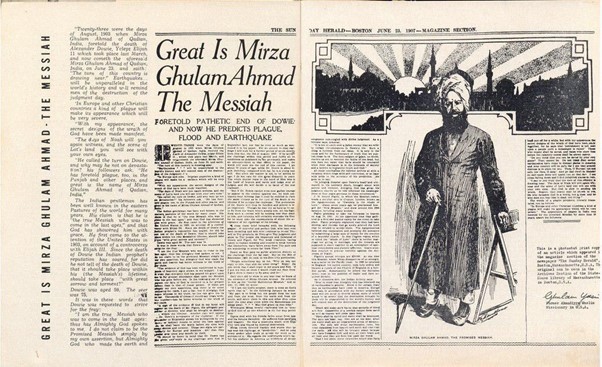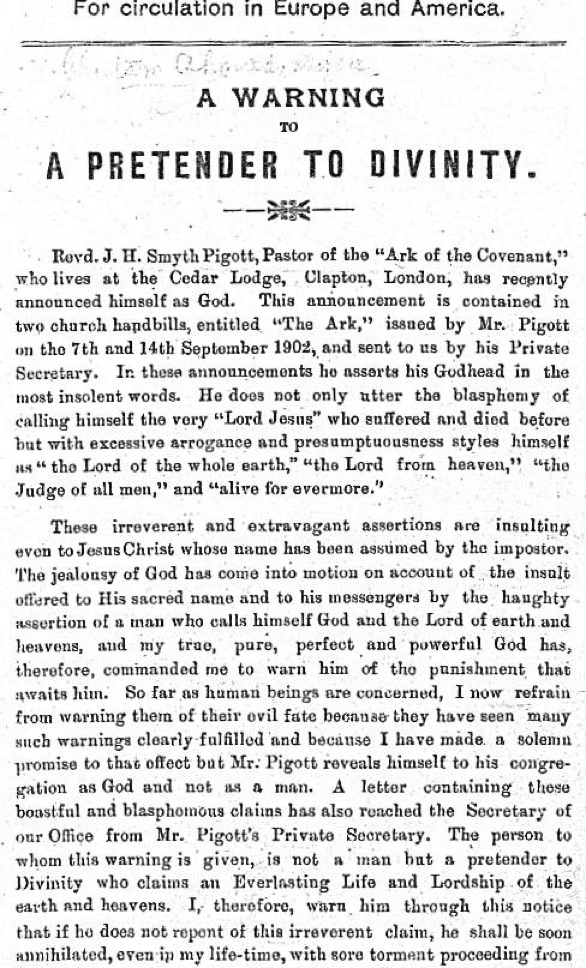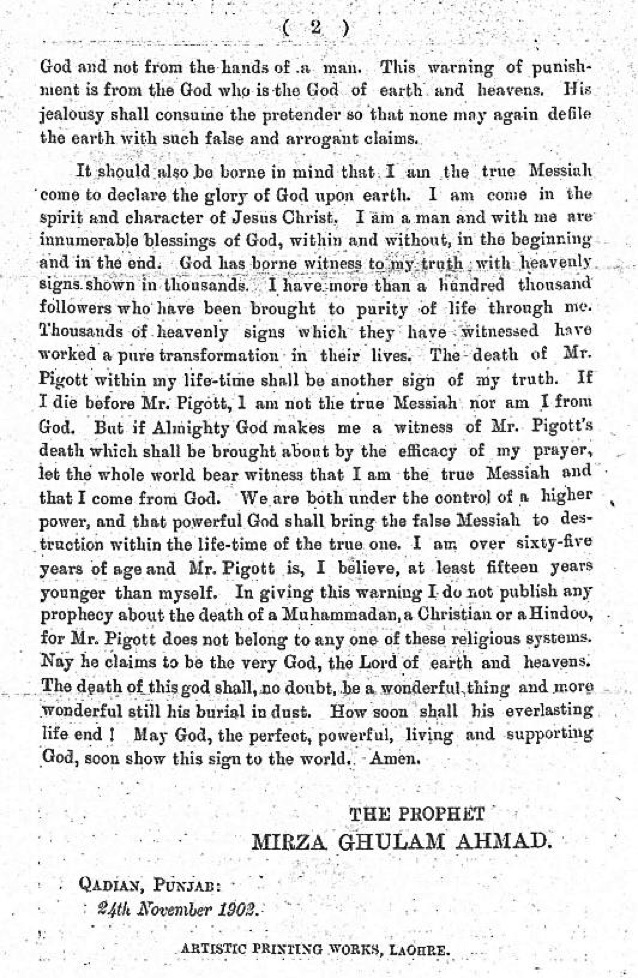The Pigott Episode : A Failed Prophecy?

The Prophet of Islam, peace and blessings of Allah be upon him, prophesied the coming of a Messiah in the future. His actual words were
إِذْ بَعَثَ اللَّهُ الْمَسِيحَ ابْنَ مَرْيَمَ فَيَنْزِلُ عِنْدَ الْمَنَارَةِ الْبَيْضَاءِ شَرْقِيَّ دِمَشْقَ
“…Allah will send Jesus, son of Mary, and he will descend near the white minaret to the East of Damascus…”
Sahih Muslim, Book of Tribulations and Portents of the Last Hour
Hazrat Mirza Ghulam Ahmad (as) of Qadian, India, (which is situated East of Damascus), claimed to be that awaited Messiah. He declared that God was revealing things to him about the future; and on that basis, he made numerous prophecies.
Many people – in some cases, millions – witnessed his prophecies being fulfilled. In particular, his bold prediction regarding the downfall and end of John Alexander Dowie, the self-proclaimed “Third Elijah”, in the United States, a man who was openly hostile to Islam. A number of American newspapers acknowledged the fulfilment of Hazrat Mirza Ghulam Ahmad’s (as) prophecy.

This is problematic for firstly, atheists, and in particular, anti-theists, because it proves there is a source of information that is more powerful than human beings – and that it is in contact with humanity and; secondly, Christians, Jews and followers of other religions, as it proves that Islam is true.
Now, you would think that out of all people in the world, Muslims would be pleased to see this living proof of not only the existence of God but also of the truth of Islam.
Well, think again!
Hazrat Mirza Ghulam Ahmad’s (as) claims to being the Promised Messiah and Imam Mahdi, along with the proofs he presented, placed Muslims in an unusual dilemma. They would now have to either sacrifice their contradictory interpretations of both Quranic verses and prophecies found in the Hadith in order to embrace this recent, living proof of God’s existence and the truth of Islam, or; sacrifice this majestic proof of God’s existence and the truth of Islam, so that they can continue to uphold contradictory interpretations of the Quran and Hadith.
And so it was that they made their choice; and, believe it or not, in a move that one can only describe as religious suicide, the majority of Muslims decided that they would stick with option two!
So too have their 21st century descendants. They have preferred to hold on to literal readings of Islamic sources, even when these interpretations create intra-textual and cross-textual contradictions; even when they lead to irrational, unscientific conclusions that leave Islam open to the criticism and mockery of those who hate or misunderstand it.
Although Muslims have been willing to let go of some unscientific statements found in the medieval commentaries of the Quran and other literature of the time, such as the flat Earth theory and geocentrism, they have proven to be resistant to relinquishing others. Some examples are: the physical ascension of Jesus into space and the prolongation of his life to enable his return to earth after 2000 years; the emergence of a live camel from a rock; chopped up birds coming back to life; and people literally being turned into apes, to name but a few.
Thus, they have chosen to oppose signs coming from God rather than revisit the validity of their hermeneutics. Clearly, holding on to the views of their ancestors, however erroneous, is more important to them than establishing the truth of Islam.
This is a shame, for prophecies constitute powerful evidence of authenticity. Fulfilled prophecies are unassailable. Statistically, the odds of guessing even 15 out of 15 right would be ≈ 0.00003% – which is, statistically speaking, highly improbable. In ordinary English, this translates to “humanly impossible”. The probability of making correct predictions will fall even further when prophecies are multifaceted.
How brave, therefore, for the Promised Messiah (as) to have declared:
“…if it is established that from one hundred of my prophecies, even one prophecy turned out to be false, I will profess to being a liar.”
Arba’een, pg 461, Ruhani Khaza’in, Vol. 17
Therefore, what can the opponents of Islam do to throw discredit on – and thus invalidate – the Promised Messiah’s (as) claims?
Well, they can try to find at least one failed prophecy.
Some thought they had hit the jackpot with the “Muhammadi Begum” prophecy. Sadly for them, they were quickly proven wrong. More recently, their error was exposed once again here and here.
Now, their hopes lie in the Pigott prophecy. Briefly, their line of argumentation is as follows: The British Rev. John Hugh Smyth Pigott claimed he was “the ever-lasting Messiah” and then God. Hazrat Mirza Ghulam Ahmad (as) subsequently sent him a message warning him that he would die within his (Mirza Ghulam Ahmad’s) lifetime. Hazrat Mirza Ghulam Ahmad (as) died in 1908, before Pigott, who died in 1927. Therefore, Hazrat Mirza Ghulam Ahmad was a fraud.
Who exactly was Rev. John Hugh Smyth Pigott? The history of this man and his movement can be accessed here.
The warning to Pigott, sent by Hazrat Mirza Ghulam Ahmad (as) to newspapers in Britain and the United States, is as follows:


The key sentences are:
“I warn him through this notice that if he does not repent of this irreverent claim, he shall soon be annihilated, even in my life-time, with sore torment proceeding from God and not from the hands of a man.”
“The death of Mr. Pigott within my life-time shall be another sign of my truth. If I die before Mr. Pigott, I am not the true Messiah nor am I from God.”
Prophecy against Pigott, 24th November 1902
On the surface, it would indeed appear that the prophecy had failed. As we shall see, however, what really transpired was far more nuanced than his detractors had assumed; and the ultimate victory was for Hazrat Mirza Ghulam Ahmad (as).
In their haste to brand Hazrat Mirza Ghulam Ahmad (as) a charlatan, his detractors overlook a crucial part of the prophecy. Before drawing conclusions, they should reflect upon what the prophecy does not say.
Does it say: “You are going to die before I do, and there’s nothing you can do about it”?
No.
In essence, what it says is: “If you do not repent of your claim (to divinity), you shall die before I do.”
The entire prophecy was therefore contingent upon Pigott’s refusal to repent of his claim to divinity.
It is on record (see ‘Rev. John Hugh Smyth Pigott, His Claim, Prophecy and End’ here) that from November 1902 when he received Hazrat Mirza Ghulam Ahmad’s (as) warning, until the latter’s demise in 1908, Pigott remained silent and made no further claims to divinity.
This clearly shows that Pigott was scared – of either the prophecy or the fierce reaction of the public to his claim, or perhaps both – and that he had repented of making further claims. Had he continued to make his brazen claims during that time period, he would have died as prophesied by Hazrat Mirza Ghulam Ahmad (as). As long as he stayed silent, he was safe.
More than six years later, after the demise of Hazrat Mirza Ghulam Ahmad (as) in May 1908, a relapse into his old ways was attributed to him; and it is alleged that as from 1909, he began to proclaim his divinity once again. As there is no published or written record of the exact wording in which this claim to divinity was made, and since not much is known of the authenticity of the allegation, for the moment it is difficult to ascertain whether or not the relapse actually occurred. What is known for sure is that from November 1902 to the end of 1908 there is no trace of a renewed claim by Pigott to divinity anywhere. From 1909 onwards, his story is one of scandal, ignominy, and the disintegration of his movement.
His bad end had been predicted by Hazrat Mirza Ghulam Ahmad (as). In an entry dated 20 November 1902, we read:
“…concerning Pigott, the Promised Messiah (as) saw in a dream some books on which was written three times: Tasbeeh, Tasbeeh, Tasbeeh [proclamation of the Holiness of Allah], and then received a revelation:
والله شديد العقاب إنهم لا يحسنون
[Translation: Allah is severe in retribution. They are not acting righteously.]
This revelation indicates that the present condition of Pigott is not good, or that he would not repent in future. It can also mean that he would not believe in God or that what he has done by telling such a lie against God and planning against Him, is not good. The part ‘Allah is severe in retribution’ shows that his end will not be good and that he will be afflicted with God’s chastisement. Indeed, it is a very daring thing to claim to be God.”
Tadhkirah, 20 November 1902
To recapitulate, the Pigott prophecy contained two parts:
Firstly, If he did not cease to make his claim to divinity, he would die before the Promised Messiah (as) – implying that if he DID cease to make such a claim during the lifetime of the Promised Messiah (as), he would remain safe. Secondly, he would finally be in a state that is not one of repentance; and he would then meet a sad end.
As it was demonstrated in ‘Rev. John Hugh Smyth Pigott, His Claim, Prophecy and End’, both parts of this prophecy were fulfilled. Hazrat Mirza Ghulam Ahmad (as) would have been proven false only if Pigott had continued to make his claim to being God after the November 1902 warning and any time thereafter, during the Promised Messiah’s (as) lifetime.
Our anti-theist critics can be reprimanded only to the degree that they have not carefully examined every aspect of the prophecy; but our Jewish, Christian and Muslim detractors are guilty of that and of forgetting their Holy Scriptures.
Regarding prophecies containing warnings, certain principles need to be established. We shall start with the Holy Quran.
Firstly, the aim of God’s warnings is to make people abandon evil and become righteous:
يَعِظُكُمْ لَعَلَّكُمْ تَذَكَّرُونَ
“He admonishes you so that you take heed.”
Holy Quran 16:91
Secondly, his aim is not to destroy people without giving them a chance to escape. He deals with people according to how they behave, and changes His dealing with them when they change their behaviour:
عَسَىٰ رَبُّكُمْ أَن يَرْحَمَكُمْ وَإِنْ عُدتُّمْ عُدْنَا وَجَعَلْنَا جَهَنَّمَ لِلْكَافِرِينَ حَصِيراً
“It may be that your Lord will now have mercy on you; but if you return (to your previous state), We too shall return, and We have made Hell a prison for the disbelievers/ungrateful ones.”
Holy Quran 17:9
Thus we see that God shows mercy (i.e. He decides not to punish them, despite having warned them of dire punishment previously) to those who change their ways.
However, if they return to their past evils, He too returns to what He had previously warned them of, and the punishment of Hell befalls them because of their relapse into evil behaviour.
We see an illustration of this in the case of the inhabitants of Nineveh. The Prophet Jonah – in Arabic, Yunus (as) – warns them that God has decided to annihilate them within a fixed period due to their despicable evils. However, God then changes His decision, and allows them to live on for a while:
فَلَوْلاَ كَانَتْ قَرْيَةٌ آمَنَتْ فَنَفَعَهَآ إِيمَانُهَا إِلاَّ قَوْمَ يُونُسَ لَمَّآ آمَنُواْ كَشَفْنَا عَنْهُمْ عَذَابَ ٱلخِزْى فِى ٱلْحَيَاةِ ٱلدُّنْيَا وَمَتَّعْنَاهُمْ إِلَىٰ حِينٍ
“Why was there no other people, save the people of Jonah, who should have believed so that their belief would have profited them? When they believed, We removed from them the punishment of disgrace in the present life, and We gave them provision for a while.”
Holy Quran 10:99
The biblical account is very clear:
3 Jonah obeyed the word of the Lord and went to Nineveh. Now Nineveh was a very large city; it took three days to go through it. 4 Jonah began by going a day’s journey into the city, proclaiming, “Forty more days and Nineveh will be overthrown.” 5 The Ninevites believed God. A fast was proclaimed, and all of them, from the greatest to the least, put on sackcloth.
6 When Jonah’s warning reached the king of Nineveh, he rose from his throne, took off his royal robes, covered himself with sackcloth and sat down in the dust. 7 This is the proclamation he issued in Nineveh: “By the decree of the king and his nobles: Do not let people or animals, herds or flocks, taste anything; do not let them eat or drink. 8 But let people and animals be covered with sackcloth. Let everyone call urgently on God. Let them give up their evil ways and their violence. 9 Who knows? God may yet relent and with compassion turn from his fierce anger so that we will not perish.”
10 When God saw what they did and how they turned from their evil ways, he relented and did not bring on them the destruction he had threatened.
Jonah 3: 3-10
Jonah (as) became angry and embarrassed. He had preached their destruction and given a fixed period within which it would be fulfilled; and now it had not occurred. He had known all along that God was compassionate and would rather forgive than punish. Yet, he had made the prophecy of annihilation to be fulfilled within a fixed time frame – and to all intents and purposes his prophecy now seemed to have turned out false:
1 But to Jonah this seemed very wrong, and he became angry. 2 He prayed to the Lord, “Isn’t this what I said, Lord, when I was still at home? That is what I tried to forestall by fleeing to Tarshish. I knew that you are a gracious and compassionate God, slow to anger and abounding in love, a God who relents from sending calamity. 3 Now, Lord, take away my life, for it is better for me to die than to live.”
4 But the Lord replied, “Is it right for you to be angry?”
Jonah 4: 1-4
From all this, therefore, we understand that when God orders a messenger of His to make a prophecy threatening destruction, and then later decides to withhold the punishment, the messenger and his followers should not feel upset or embarrassed by the fact that the prophecy did not get fulfilled; nor should they feel that their truthfulness had now been jeopardised. Only Allah knows what changes His creatures have brought about in their hearts. If they bring about a positive change, He cancels the punishment He had warned them of. However, if later on they return to their evil ways, He too returns to His threat of punishment and finally, after a while, His chastisement overtakes them.
Thirdly, the fact that people actually do change their behaviour after being threatened with annihilation, even though the change is only partial, will make God cancel some of the parts of the prophecy accordingly. This phenomenon appears in the episode of the believer who was a member of Pharaoh’s family at the time of Moses (as). His words have been preserved for all time to come in the Quran. When the plot to kill Moses (as) was being hatched, this is what happened:
وَقَالَ رَجُلٌ مُّؤْمِنٌ مِّنْ آلِ فِرْعَوْنَ يَكْتُمُ إِيمَانَهُ أَتَقْتُلُونَ رَجُلاً أَن يَقُولَ رَبِّىَ ٱللَّهُ وَقَدْ جَآءَكُمْ بِٱلْبَيِّنَاتِ مِن رَّبِّكُمْ وَإِن يَكُ كَاذِباً فَعَلَيْهِ كَذِبُهُ وَإِن يَكُ صَادِقاً يُصِبْكُمْ بَعْضُ ٱلَّذِى يَعِدُكُمْ إِنَّ ٱللَّهَ لاَ يَهْدِى مَنْ هُوَ مُسْرِفٌ كَذَّابٌ
“And a believing man from among the people of Pharaoh, who concealed his faith, said, “Will you slay a man because he says, ‘My Lord is Allah,’ while he has brought you clear proofs from your Lord? And if he be a liar, on him will be the sin of his lie; but if he is truthful, then some of that which he threatens you with will surely befall you. Certainly, Allah guides not one who is a transgressor, and a liar. “
Surah Al-Mu’min, 40:29
Thus, not everything a prophet of God threatens people with is fulfilled. Only some of it is, according to the degree to which they improve their behaviour, even temporarily.
This is exactly what had occurred in the case of Pigott. After having been made aware of the prophecy of his destruction within a fixed time frame, he completely ceased to make his wild public claims right up to the time of the Promised Messiah’s (as) demise. God therefore allowed him to live past the time that had been set conditionally for his destruction, as this no longer applied. Later on, God allowed the natural consequences of Pigott’s past deeds to catch up with him. His movement collapsed and he died in a state in which he no longer had his former status and glory. Today, his movement is no more.
In contrast with this, the Promised Messiah (as) passed away with the great satisfaction of having seen over 300 000 followers join him despite all the odds and his poor health; and his movement has never ceased to progress. His message is now being preached to the four corners of the earth from Pigott’s own country, the United Kingdom, and he has over 30 000 followers in the UK alone.
Like Jonah (as), the Promised Messiah (as) used very forceful and categorical words to warn Pigott. The idea was to get him to change his ways. Pigott did change his ways, so the prophecy of death was withheld by God. Then, he was allowed to live on to see his movement slowly crumbling. The non-fulfilment of conditional prophecies does not affect the truthfulness of prophets. As stated previously, the fulfilment of such prophecies depends on the behaviour of their targets.
This is in perfect accordance with the Quranic and Biblical principles mentioned above.
There will always be certain individuals who will find any excuse to reject some of God’s messengers, and who will therefore refuse to accept these Quranic and Biblical principles. Such people can never be satisfied. They are consumed by doubts and therefore miss out on the immense blessings brought by the messengers.
By contrast, to those who take these religious principles into account, all these seemingly problematic issues are very clear, and they find them to be perfectly in line with what God states in His Holy Books.
That the Pigott prophecy was so clearly fulfilled is just another proof of the truthfulness of Hazrat Mirza Ghulam Ahmad, the Promised Messiah and Imam Mahdi (as).
In view of the chilling fate met by his opponents, his modern detractors would do well to embrace him.
More articles
Contact
National Outreach Department:181 London Rd, Morden SM4 5PT, U.K.
Email: [email protected]Phone: 0208 6877804
@ 2025 Ahmadiyya Muslim Community, All Rights Reserved.